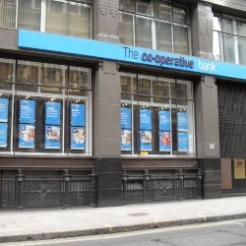The Co-operative Bank, a popular banking choice for charities, will be unlikely to maintain its ethical approach following its takeover by hedge funds but its philanthropy will sustain, suggests Andre Spicer, a Cass Business School professor.
The Co-operative Group has this week been forced to abandon its 170-year-old mutual ownership structure after handing a majority share of its banking arm to US hedge funds, including Aurelius Capital Management and Silver Point Capital, and other creditors.
The move is part of a deal with bondholders to plug a£1.5bn capital shortfall and avoid a taxpayer bailout.
In August, the Co-operative Group reported that it made losses of £559m in the first six months of the year, after writing off £496m of loans in its banking division.
In 2012 the Group recorded an £18m profit, but the results this year revealed a dramatic change of fortunes, including a £1.5bn capital shortfall that banking regulator the Prudential Regulation Authority (PRA) insisted that the Group dealt with.
Co-operative Bank is the most-used primary bank for charities with an income between £1m and £5m in Charity Finance’s 2013 Banking Survey, and is the third most popular for those with an income between £5m and £20m.
Philanthropy will sustain
Commenting on the new ownership structure of the Co-operative Bank, Andre Spicer, professor of organisational behaviour at Cass Business School, said:
"It is unlikely that the Co-op will maintain its ethical approach in the long run. History suggests that once a mutual bank is privatised it drops the focus on doing good to focus on doing well for shareholders. Many ex-mutuals became some of the worst offenders in the lead up to the financial crisis. Previously co-operatively owned banks like Northern Rock and Branford and Bingley were dominated by a hard driving sales culture. They had loan books stuffed with dodgy loans. All this was due to the over-riding search for shareholder returns.
"Private control of the Co-op will also have other outcomes. The number of staff the Co-op employs is likely to drop as management search for efficiencies. Staff who remain are likely to find themselves loaded down with various restructuring efforts. Despite assurances by the new owners, the Co-op is likely to have a more commercially focused culture. One thing which is unlikely to change is the amount of giving the bank is engaged in. Philanthropy is usually the same before and after de-mutualisation."
Last year, the Co-operative selected Carers Trust as its 2013 charity of the year, a partnership worth a targeted £5m.
In a video message this week, the Co-operative Group chief executive, Euan Sutherland, who joined this May, suggested the organisation's ethos will not change: “It will remain the Co-operative Bank. We are embedding the principles in the constitution of the bank to guarantee this.”
Charities maintain support
A spokesman from the University of York Students’ Union, which banks with the Co-op, said it “had no immediate plans to change”. But he added: “We have not yet received reassurances from the bank and would welcome these."
An NSPCC spokesperson said: “We continue to bank with Co-op for our community fundraising branches and have no current plans for this to change, but we will continue to monitor the situation to ensure we are getting the best service for our supporters.”
Meamwhile, Kathy Leaver, a principal at the Co-operative Academy of Manchester, said: “I was pleased to see the comments from Euan Sutherland that the Co-operative principles would be embedded in the constitution of the bank.”









